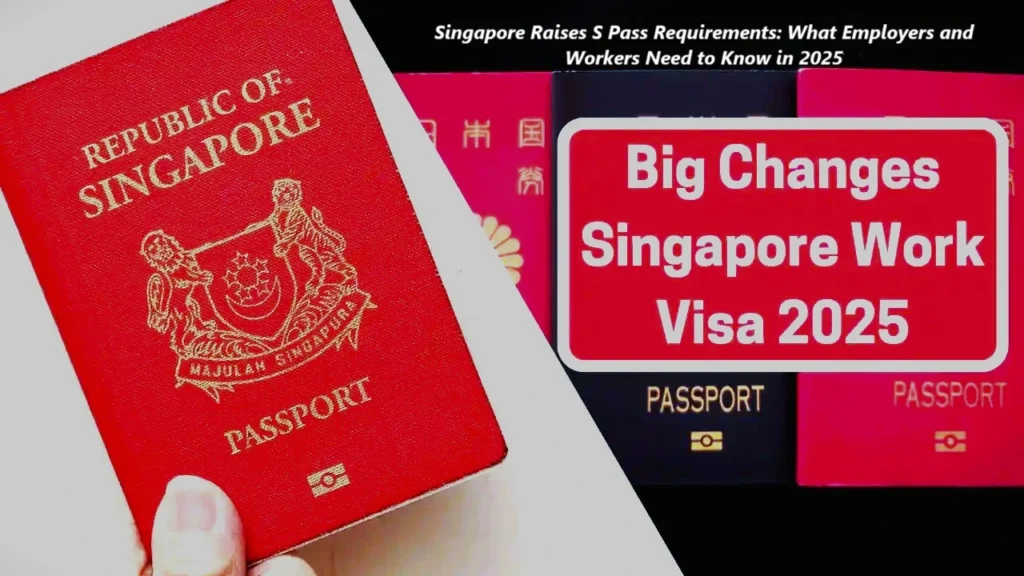Learn about the new S Pass requirements in Singapore for 2025, including salary hikes, increased levies, and stricter quotas for employers and foreign workers.
Understanding the New S Pass Changes in 2025
In 2025, Singapore has implemented new reforms to the S Pass framework, impacting both employers and foreign workers. The S Pass is a crucial work permit that allows mid-skilled foreign workers to work in Singapore. However, recent adjustments—including higher salary thresholds, increased levies, and stricter quotas—reflect the government’s efforts to prioritize local employment while maintaining a skilled workforce. This article will break down these key changes, explaining how they will affect both employers and workers.
What is the S Pass?
The S Pass is a work pass designed for mid-skilled foreign workers such as technicians, administrative professionals, and other skilled roles in Singapore. The pass allows employers to hire foreign workers who contribute to Singapore’s workforce, especially in industries requiring specific technical expertise. Under the revised rules, these workers will now face tougher eligibility criteria, especially regarding salary and quotas.
Key Changes in the S Pass Framework
| Change | Details | Effective Date |
|---|---|---|
| Minimum Salary Requirements | Salary for non-financial sectors raised to S$3,500, financial sectors to S$4,200. | September 2025 |
| Employer Levy Costs | Monthly levies for employers raised from SGD 330-650 to SGD 450-750. | Immediate |
| Stricter Quotas for Foreign Workers | Reduced Dependency Ratio Ceiling (DRC) in manufacturing from 18% to 15%, services from 10% to 8%. | Immediate |
1. Higher Minimum Salary Requirements
From September 2025, the minimum salary for S Pass holders will increase to S$3,500 for non-financial sectors and S$4,200 for the financial sector. This salary hike is designed to attract higher-paid foreign workers, ensuring that the workforce continues to meet the demands of a growing economy while balancing the needs of local talent.
2. Increased Employer Levy Costs
In addition to the salary hikes, employers will face higher monthly levies for hiring S Pass holders. For non-financial sectors, the levy will rise from SGD 330 to SGD 450, and for higher tiers, it will increase from SGD 650 to SGD 750. This cost increase is aimed at encouraging employers to prioritize hiring local talent and reduce over-reliance on foreign workers.
3. Stricter Foreign Workers Quota
The Dependency Ratio Ceiling (DRC), which limits the number of foreign workers in a company, will also become stricter.
- In the manufacturing sector, the DRC will decrease from 18% to 15%.
- In the services sector, it will drop from 10% to 8%.
These stricter quotas are designed to reduce dependency on foreign labor, ensuring more job opportunities for local workers.
Why Are These Changes Being Made?
The S Pass reforms reflect Singapore’s efforts to maintain a competitive labor market while safeguarding local employment. The government aims to balance foreign labor needs with local workforce priorities, ensuring fair competition and fostering a sustainable, long-term economic model.
Impact on Employers and Foreign Workers
Impact on Employers:
Employers will face higher costs for hiring foreign workers due to the increase in levies and salary requirements. This may prompt employers to reassess their workforce strategies, invest more in local talent development, and adapt to the new quotas to stay compliant.
Impact on Foreign Workers:
For foreign workers, the new salary thresholds could pose a challenge, limiting access to the S Pass for some candidates. Those wishing to continue working in Singapore may need to enhance their skills and qualifications to meet the revised standards. For those planning to stay longer, exploring long-term residency or other work pass options may become increasingly necessary.
Preparing for the Transition
Both employers and foreign workers are encouraged to prepare for these upcoming changes:
- Employers should review their hiring strategies and budget allocations to account for the higher levies and salary requirements.
- Foreign workers should upskill and improve their qualifications to remain competitive in the job market. Exploring alternative work permits or longer-term residency options may also help secure employment in Singapore.
Navigating the New S Pass Regulations
The tightening of S Pass requirements in 2025 underscores Singapore’s commitment to creating a balanced labor market that favors local talent while still welcoming skilled foreign workers. These changes, though challenging for employers and workers alike, reflect the government’s dedication to fostering economic resilience and workforce inclusivity. By adapting to these new rules, Singapore can continue to attract top-tier talent while ensuring fair competition for all workers.
In summary, whether you’re an employer or a foreign worker, it is crucial to stay informed about these changes to ensure smooth compliance and long-term success in Singapore’s evolving workforce landscape.



